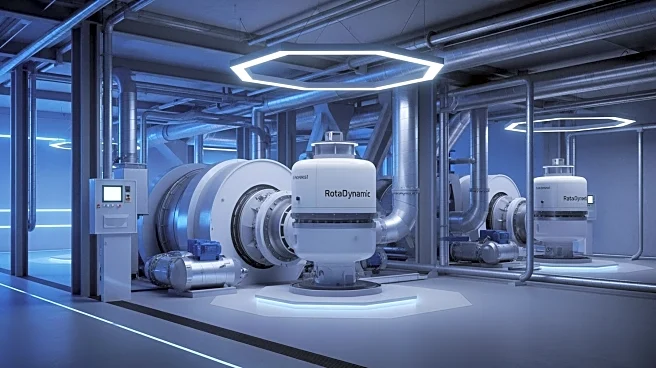What's Happening?
Adani Cement, in collaboration with Coolbrook, has announced the deployment of the world's first commercial RotoDynamic Heater (RDH) technology at the Boyareddypalli Integrated Cement Plant in Andhra Pradesh, India. This innovative technology aims to decarbonise
the calcination phase of cement production, which is traditionally fossil fuel-intensive. The RDH system will be powered entirely by Adani Cement's renewable energy portfolio, ensuring emission-free industrial heat generation. This deployment is expected to reduce approximately 60,000 tonnes of carbon emissions annually, with potential for further reductions. The initiative marks a significant step towards Adani Cement's net-zero goals by 2050, validated by the Science Based Targets initiative (SBTi).
Why It's Important?
The deployment of RDH technology by Adani Cement represents a major advancement in industrial decarbonisation, particularly in the cement sector, which is known for high carbon emissions. By integrating renewable energy sources to power the RDH system, Adani Cement is setting a new standard for low-carbon cement manufacturing. This move not only accelerates the shift away from fossil fuels but also enhances the utilization of clean energy sources. The project serves as a scalable model for other industries seeking to reduce their carbon footprint, potentially influencing global cement production practices and contributing to broader climate action goals.
What's Next?
Adani Cement and Coolbrook plan to explore additional opportunities for deploying RotoDynamic Technology across Adani Cement's operations, with ambitions to launch at least five more projects within the next two years. The RDH technology will play a crucial role in improving process efficiency and increasing the use of alternative fuels and green power. Adani Cement aims to achieve 30% usage of alternative fuels and 60% green power by FY28. This ongoing partnership reflects a commitment to innovation and sustainability, positioning Adani Cement as a leader in climate action and industrial decarbonisation.
Beyond the Headlines
The deployment of RDH technology highlights the potential for electrification in hard-to-abate sectors like cement production. By setting a precedent for clean, electrified industrial heat, Adani Cement is contributing to the global effort to reduce carbon emissions and combat climate change. The collaboration with Coolbrook underscores the importance of partnerships in achieving sustainability goals and demonstrates the feasibility of large-scale industrial decarbonisation. This initiative may inspire other companies to adopt similar technologies, fostering a shift towards more sustainable manufacturing practices worldwide.















